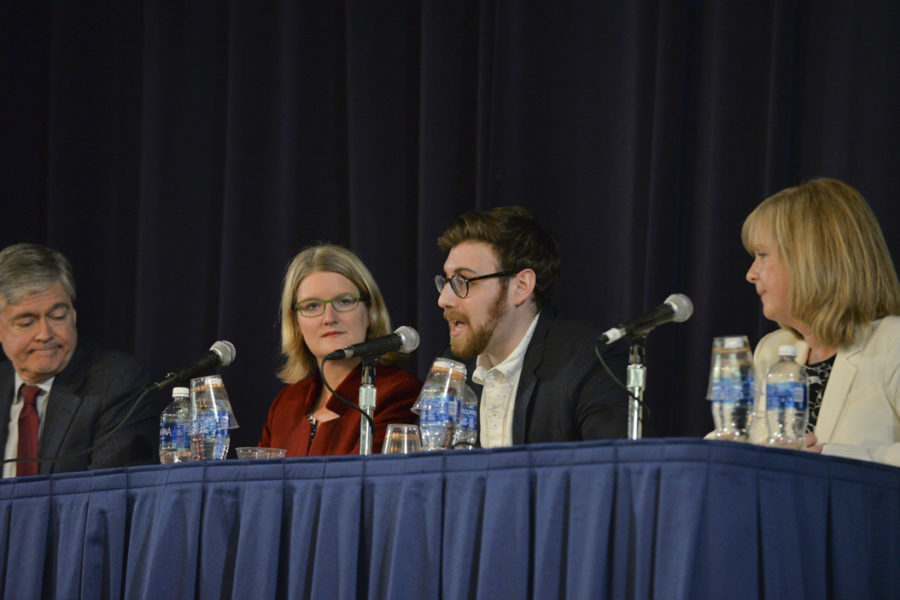Five renowned political journalists sat down under Alumni Hall’s dim lights Thursday night to discuss their most recent and controversial challenge: President Donald Trump.
More than 150 people were gathered in the seventh-floor auditorium to learn about journalism’s revival — and attacks on its integrity — under the Trump administration.
Provost Patricia E. Beeson and English Professor Cynthia Skrzycki gave a brief introduction at the event’s 6:30 p.m. start. The moderator for the night, Pittsburgh Post-Gazette Executive Editor David Shribman, prompted the panelists with questions about potential bias in media, responses to Trump and the presence of “fake news” in their lives.
To begin, Shribman quoted former President John F. Kennedy and said, “Only a few generations have been granted the role of defending freedom in its hour of maximum danger.”
“Only a few generations have been given the role of defending journalism,” Shribman added as his response to the quote.
Senior manager of the American Press Institute Jane Elizabeth said accountability journalism, a concept rooted in meticulous fact-checking and holding news outlets to high standards, is on the rise.
It was the idea of truth — and its increasing malleability — that lay at the center of Thursday’s discussion. Trump’s team has become infamous for speaking without regard for the factuality of their claims, and his supporters likewise don’t seem to care whether he’s telling the truth or not.
Even easily disprovable statements from the President, like his assertion that his inauguration ceremony was packed, have become difficult to challenge, the panelists said.
“What’s interesting is that Trump has done such an excellent job muddying these waters,” said panelist Steven Perlberg, a media and politics reporter for Buzzfeed News.
Many people believe the press’ biggest issue is misinformation, Elizabeth said. “Fake news,” a term that is being increasingly associated with the press, frustrates her because it serves as a diversion from more pressing issues.
“We need to start figuring out what [the public] want us to write about, not about who lied and who lied more and who lied less,” she said.
With President Trump regularly attacking news outlets, labelling them fake and untrustworthy — normally via Twitter — the media must respond in a professional but effective way, said Perlberg.
The most important responsibility for modern journalists, said John Harwood — chief Washington correspondent for CNBC and political writer for The New York Times — is the still the same as it’s always been.
“The definition of a journalist is somebody who is in the truth business who sets out to tell the truth,” Harwood said.
Angela Greiling Keane, deputy technology editor for Politico Pro, acknowledged a long history of tension between journalists and political administrations — people who tend to be journalists are those who question authority, she said.
But that dynamic is now amplified.
“The information would come with a spin, but we didn’t question whether most of it was true,” she said of the difference between today’s news coverage and that of previous political administrations.
Though attacks on “the media” as a whole were prolific this election season — and some media representatives admitted fault in missing the importance of Trump’s rise — the Washington Post’s Erik Wemple said politicians are equally to blame for this distrust.
“Our media gets eroded because people lie and disavow what they said before…[so] they blame the media,” Wemple said. He added that journalists shouldn’t be afraid to call someone out as a liar.
Patricia O’Malley, 62, of Brentwood, writes a blog called Community Matters that explains the news rather than reporting it. At the discussion Thursday, O’Malley said journalists are becoming “too lazy and sloppy. She came to the event hoping to ask some questions.
“The political illiteracy of so many journalists is interfering with the public’s understanding of what’s going on,” O’Malley said.
Regardless of the attendees positions on their trust in the media, all of the panelists and everyone in the audience seemed to agree on a central point.
“Truth is an issue, and truth is worth discussion,” said Wemple.



